Jaap Stam exclusive: I could have been on Big Brother – I had to get back into football
The former Manchester United defender, who returns to Old Trafford on Saturday, is thriving in the dugout at Reading – after snubbing reality TV
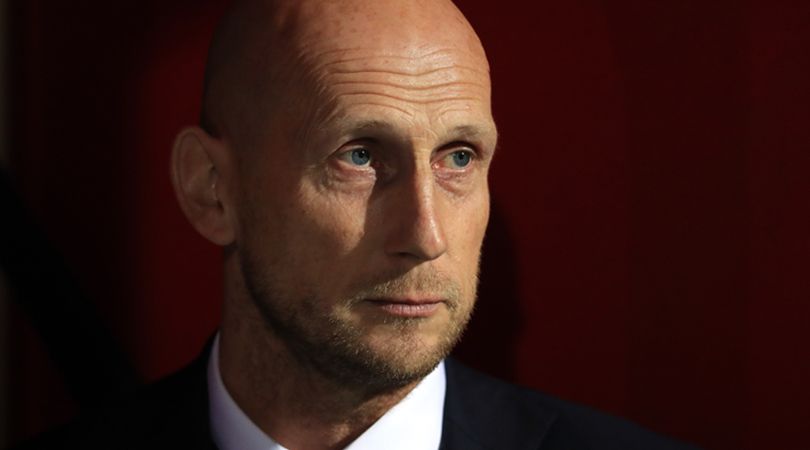
When you retired as a player back in 2007, you said that you had no interest in moving into management. Why did you change your mind?
Yes, I admit I was completely wrong. At the time I finished playing, I thought I didn’t want all that pressure any more, but I had to do something – I’m not the type of person to sit at home and stare out of the window all day. I was offered lots of television work, including being on the Dutch version of Big Brother, but I didn’t want that. The truth is when I retired from football, I stopped being involved in the most beautiful thing in my life, so I had to get back into it again.
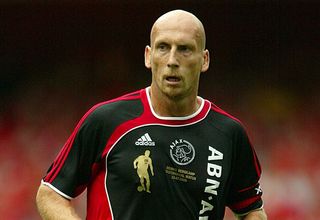
It’s been nine years since you hung up your boots – have you benefited from that time?
You need the time to educate yourself [as a coach], and I found out how to stand in front of a group of players, hold their attention and communicate my ideas
It’s a long time to wait, but I learned a lot. I think I know how to be a manager. If you go straight into coaching it doesn’t mean you are a good coach. You need the time to educate yourself, and I found out how to stand in front of a group of players, hold their attention and communicate my ideas. I started at my first professional club, FC Zwolle. They asked me to help out and a few days turned into a few years. We helped them to win the league title and get promoted, and then I moved on to Ajax as Frank de Boer’s assistant and also managed the under-21 side, Jong Ajax.
Did you have any conversations with the great Johan Cruyff while you were at Ajax?
Yes, and it was an honour to speak with Johan. I already knew him through his son, Jordi, when we were at Manchester United together. But at Ajax he shared with me what he expects from the players and the coaches. He always just wanted to attack, and he told me, “If you’re attacking very well, you don’t need to defend.”
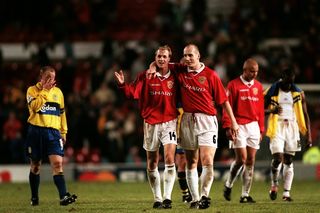
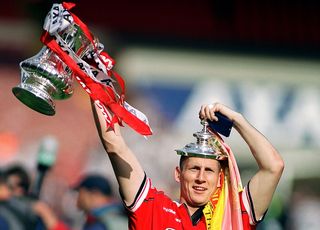
Player of the year: A shock 1-0 win over Ajax earns Stam a move from Willem II to PSV, where he wins the 1996/97 Eredivisie title and is named Dutch Footballer of the Year.
Dutch master: A month after a £10.75 million move to Man United made him the most expensive defender in history, he helps the Dutch reach the semis of the 1998 World Cup.
Instant Treble: Wins the Treble in his first season at Old Trafford, lifting the Premier League trophy and FA Cup before lining up in the famous Champions League victory over Bayern Munich.
Why did you choose to start your management career in England rather than in the Netherlands?
Get FourFourTwo Newsletter
The best features, fun and footballing quizzes, straight to your inbox every week.
I had some good offers in Holland, but I always wanted my very first manager’s job to be in England. I asked Ronald Koeman and Guus Hiddink for advice, and they agreed I should come here first. I felt I was ready to take the next step and the best place to do that was England.
What appealed to you about going to Reading in the Championship?
The club just felt right. I liked hearing about how they wanted to play, plus their ambitions and what they were looking to achieve. The club want to get promotion to the Premier League, but all 24 teams want that. We are still building and people want to do it as quickly as possible, but maybe that’s not possible in the first season.
How would you characterise your style of play now you’re a manager?
I want to play attractive football – it is the Dutch way. Forget that I was a defender; I want to attack and win football matches. Some might call it Total Football, but my intention is to try to dominate games and win them.
How have you been influenced by the great managers you played under in your career?
I wasn’t the type who would write down everything they said in a book, but now I’ve thought a lot about the managers I played under and taken so many different things. From Alex Ferguson, I’ve hopefully learned how to build a team. I watched how he put together a winning squad – the players he brought in for the style he wanted to play, but also for the characters he needed for the mental side of the game. He didn’t look at just the big names – he concentrated on the overall qualities he needed.
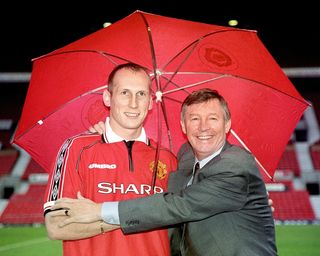
You were always very confident as a player. Do you believe you’ll succeed as a manager as well?
I do. I’m very confident we’re going to do well. Hopefully we can get success, and we will see where that leads us.
Would you ever be interested in becoming Manchester United’s manager one day in the future?
I’m not the type to say I want that one day, because first I want to do well at Reading. But I’m ambitious, I want to get as high as I possibly can as a manager, and I do want to get to the top level eventually.
This feature originally appeared in the December 2016 issue of FourFourTwo. Subscribe!
More interviews • New features you'd like every day on FourFourTwo.com
Sam Pilger is a freelance sports writer who writes for Forbes, FourFourTwo, Optus Sport, The Athletic and The Times Magazine. He was previously the deputy editor of FourFourTwo magazine (lucky him), still contributes regularly and has written several books, including Manchester United's Best XI and For Club and Country with Gary and Phil Neville.

‘People said I was unsporting in the 1984 European Cup Final – my logic was if an international player can’t hit the target from 12 yards, it’s not my fault’: Liverpool hero Bruce Grobbelaar justifies penalty tactics against Roma

‘I had it in my contract when I joined Barcelona from Spurs that I’d wear the No.8 shirt – Bernd Schuster said no, so I took Diego Maradona’s No.10 instead’: Scotland hero recalls replacing Argentinian legend at Barca in 1984